
A bill that would have increased spending on bicycling and walking infrastructure on the 50th anniversary of Oregon’s legendary “Bike Bill” has died in committee.
“The basic reason is lack of funding.”
— Lee Beyer, Oregon State Senator (D-Springfield)
Senate Bill 395, dubbed the “Safe Routes for All Bill”, needed to be scheduled for a work session in the Joint Committee on Transportation by last Friday (5/14), but committee chairs didn’t make that happen. The bill sought to increase the minimum State Highway Fund spending requirement on bike/ped infrastructure from 1% to 5%. Given that ODOT spends an average of about 1.14% currently (which equaled about $8.7 million total) and the highest they’ve ever spent was 2.23%, the bill would have given a significant boost to active transportation.
The Street Trust (formerly Bicycle Transportation Alliance) launched a statewide coalition in support of the bill in March and had the backing of Eugene Senator Floyd Prozanski. Prozanski is a bicycle rider himself and has a long track record of supporting and passing bike-related legislation. After trying to manage expectations around the bill in February, he ultimately told supporters it was one of his two top priorities this session.
Advertisement
Given the steep challenges of passing a bike/walk funding increase, Prozanski said he felt a 3% spending minimum would be more realistic. But not even that relatively paltry sum could get members of the transportation committee to move the bill forward.
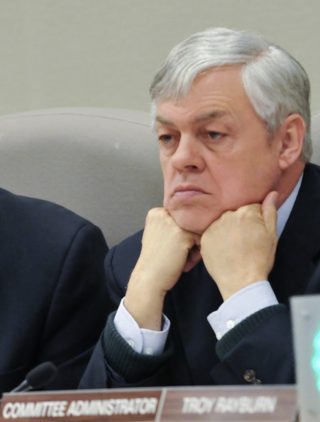
(Photo: Jonathan Maus/BikePortland)
Oregon State Senator and Joint Transportation Committee Co-Chair Lee Beyer told BikePortland via email this afternoon that, “The basic reason [the bill won’t move forward] is lack of funding.” Sen. Beyer said ODOT and Oregon cities don’t have enough money to maintain what they have. “It is not that the state is not supportive of bike paths,” Beyer said. “We would like to do more. Our primary responsibility however, is maintaining the freight and intercity traffic routes. The intra-city roads system and priorities are left up to the cities.”
Beyer also said that cities and counties can opt to spend more than the 1% minimum already, and many already do.
Meanwhile, Beyer has been a stalwart supporter of freeway expansion projects and his committee is poised to vote on a bill that would greenlight hundreds of millions for ODOT to widen them in the Portland area.
Beyer’s reluctance also might have something to do with the very influential opposition he and other lawmakers heard at the bill’s only public hearing in early March.
The spending requirement is currently only triggered when a road project is “constructed, reconstructed or relocated”. SB 395 added “resurfaced” to that list. This led to a concern that it would siphon funds away from paving maintenance projects and led a representative for the Oregon Association of Counties to testify at the March hearing that, “It’s an unfunded mandate in the form of a diversion of 4% of county road budgets.”
In an email to supporters this morning, The Street Trust Executive Director Sarah Iannarone wrote, “Like you we are sad, disappointed, and frustrated. Every day that Oregonians have to rely on unsafe routes to walk and bike puts their lives at risk… To honor the precious lives lost in recent weeks and months, we will continue to demand our elected and appointed officials take seriously their responsibility to our safety and quality of life.”
Iannarone said the Safe Routes for All campaign led to important steps forward for the active transportation movement. The education, media exposure, engagement, and coalition built for this effort, she said, will help when they return to the legislature in upcoming sessions.
“Like you, we are sad, disappointed, and frustrated.”
— Sarah Iannarone, The Street Trust
Specifically, Iannarone shared a promise to continue building a statewide coalition for bigger wins down the road. “We are going to work with counties and cities to prioritize these transportation solutions… And we need to keep growing this statewide movement to persuade resistant legislators and cultivate champions who will pursue that better transportation future.”
Hau Hagedorn, an advocate who served as Chair of the Oregon Bicycle and Pedestrian Advisory Committee and whose master’s thesis on the Bike Bill was the inspiration for SB 395, told us she was, “disappointed, but not surprised”:
“This has been a recurring theme for many things in the past year. It speaks volumes to the ways in which transportation funding has been broken for decades which continually reinforces the modal wars pitting vehicles against every other road user. At the end of the day, if our roads were designed to be safe and efficient for all users in the first place especially for pedestrians and bicyclists we wouldn’t be fighting so hard for better accommodations. If the law was being effectively implemented over the past 50 years to create safer conditions for people to walk and bike, perhaps we wouldn’t have seen a record number of pedestrian and traffic fatalities this past year.
For Rob Zako, leader of Better Eugene-Springfield Transportation (BEST), it’s not worth getting too crestfallen by this news. “This has been a difficult legislative session. A lot of good bills did not move forward simply due to lack of time,” he shared in an email to BikePortland today.
“More broadly,” Zako shared. “SB 395 begs the question of values: What is the value of a human life? Is it as much as the value of preserving asphalt or or reducing the costs of travel delay?” Zako cited a recent ODOT boondoggle (the Highway 20 Corvallis – Newport project) that was estimated to cost $140 million but ballooned to $400 million. “The stated purpose of the project was to straighten out Highway 20 in order to save lives. But the $400 million represents over 50 years of what the Bike Bill currently requires ODOT to spend on walking and biking. Could that $400 million have been spent differently all across Oregon to save even more lives?”
One source close to the legislative process that contacted us on background, echoed many of these sentiments, and urged us to look ahead: “Passing any bill through the legislature is often a multi-year process and the push by the bike/ped community this session along with Sen Prozanski’s continued leadership have been good and necessary building blocks for future legislative efforts.”
— Jonathan Maus: (503) 706-8804, @jonathan_maus on Twitter and jonathan@bikeportland.org
— Get our headlines delivered to your inbox.
— Support this independent community media outlet with a one-time contribution or monthly subscription.

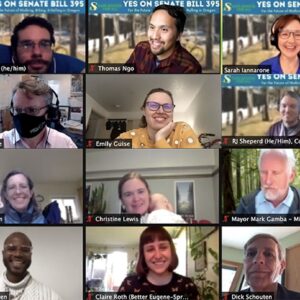
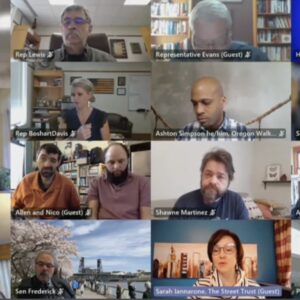
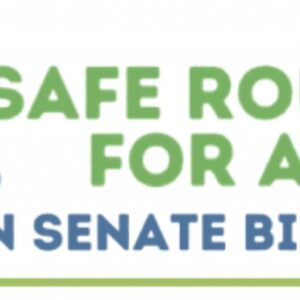
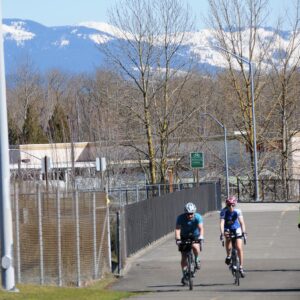
Thanks for reading.
BikePortland has served this community with independent community journalism since 2005. We rely on subscriptions from readers like you to survive. Your financial support is vital in keeping this valuable resource alive and well.
Please subscribe today to strengthen and expand our work.
Association of Oregon Counties fought legal marijuana very hard. It’s a really conservative organization. I’m sure it’s mostly about preserving the status quo and that only liberals in spandex ride bikes where real workers drive Mack trucks or duelies.
In my opinion, the statement “Our primary responsibility however, is maintaining the freight (and intercity traffic) routes” doesn’t align very directly with ODOT’s mission statement.
Mission Statement
We provide a safe and reliable multimodal transportation system that connects people and helps Oregon’s communities and economy thrive.
That struck me as well. Nor does it follow that you can’t spend 97% on your primary responsibility and 3% on secondary responsibilities like, say, the quarter of Oregonians who can’t drive. Indeed, having something as a primary responsibility only implies spending the plurality of your funds on it.
Beyer has been captured by the highway lobby, is happy to spend billions expanding roads, and can’t be bothered to give pocket change to help Oregonians who lose their lives simply biking or walking. He’s a main hurdle in the legislature.
In my opinion, it’s time for new leadership at The Street Trust. Need someone who understands the state as a whole to get things done in Salem.
I’m not sure that I agree with this. Yet.
When Iannarone ran for mayor she claimed to be a coalition builder yet lots of people were skeptical of her abilities. The Street Trust gives a platform outside of elected office to see if she can actually do so. If she can actually assemble a coalition and do something different from the status quo, awesome! Maybe she should be the mayor in the future. If she can only get one legislative champion and can’t get a bill out of committee, then maybe she’s not capable and the voters of Portland made the right decision.
I’ve been extremely skeptical of her and I voted for Ted. Not because I like him but I was terrified of what Iannarone would do if elected. Things like the genocide skirt (skirt made from fabric featuring pictures of Mao and Stalin) made me really question her judgement.
Happy to see her in a lower profile role to see what skills she actually has.
The main problem isn’t the leadership; it’s the power dynamic of the freight lobby and construction firms.
The Street Trust has six staff and a million dollar annual budget. The freight/road construction folks spend billions and have lots of full time lobbyists, as well as the ability to donate significantly to campaigns.
What one needs to get things done in Salem is to elect the right people, who are able to stand up to the powerful lobbyists and the pressure.
Do you have a good example of a bike advocacy group anywhere in the U.S. that’s managed to pass big budget things? Sure, there are crumbs (like Oregon’s Safe Routes to School funding), and yes, there are legal changes, but when it comes to the dollars… it’s really, really hard.
What I think people miss about this bill is that it didn’t require any new funding. It would have simply required DOT to spend more of existing money on bicycling/walking infrastructure. Please correct me if I’m wrong.
This JM comment here is ultimately about the Street Trust and their ability to be effective, the job of their director. If people didn’t have this point made and front of mind, the blame falls on The Street Trust for not being able to move that message.
And this is one of the most progressive legislatures in the country, with tremendous influence there by progressive groups like OLCV. If you can’t get things done with this legislature, then it’s kind a ‘you’ problem not a ‘them’ problem.
Does the Street Trust leadership know how to build coalitions and get broad support? Time will tell, but so far doesn’t look like they have been able to do so.
I know this is an old quote but it’s worth pointing out how patently false this is. This is literally a funded mandate, it’s just funding things with existing money that the OAC doesn’t want to fund. Bizarre that legislators and the media didn’t confront them on this obvious lie.
And as the Oregon legislature comes to a close for the year(!), I wish again it had a more significant role in our state. But with 160 days on odd-numbered years and just 35 days on even-numbered years*, the vast majority of the power lies with statewide officials and agencies. And those agencies, like ODOT, are working every business day of the year and just have to swat away meddlesome legislative bills every now and then.
It’s a system that’s really designed to dilute the power of local communities in favor of the wealthy and politically powerful who can lobby those unelected agencies year-round.
We need a full-time state legislature.
* You can look this up on the legislature’s website, or on the Wikipedia page for “Oregon legislature”.
As we move on let’s not forget the lessons we’ve learned with SB 395. When the next version of this bill appears, all of us need to fully support the efforts of the proponents in order to get the legislative votes. Here’s what that might look like:contact your city councilors, county commissioners, joint transportation committee members, senators and reps requesting support for the measure. Contribute financially to help pay for lobbyists and consultants(more than you did last time). Write letters and op eds to the media. If there’s a Zoom meeting, join in to show your support. Encourage others to do the same.